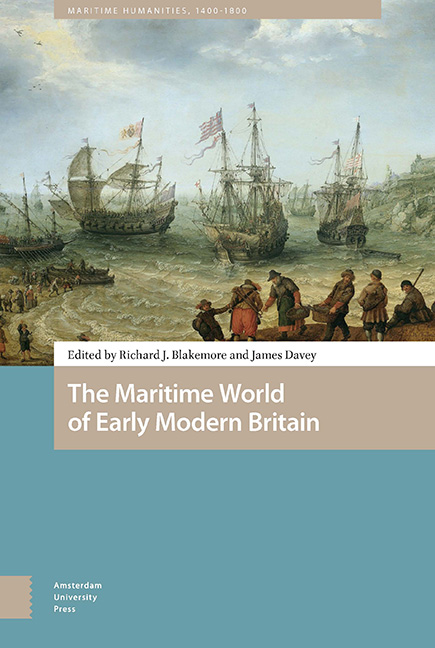Book contents
- Frontmatter
- Contents
- List of illustartions
- Acknowledgements
- Note on Conventions and Terminology
- Introduction
- 1 The Minion and Its Travels: Sailing to Guinea in the Sixteenth Century
- 2 Commanding the World Itself : Sir Walter Ralegh, La Popelinière, and the Huguenot Influence on Early English Sea Power
- 3 An Investigation of the Size and Geographical Distribution of the English, Welsh, and Channel Islands Merchant Fleet: A Case Study of 1571–72
- 4 An Evaluation of Scottish Trade with Iberia during the Anglo-Spanish War, 1585-1604
- 5 Performing ‘Water’ Ralegh : The Cultural Politics of Sea Captains in Late Elizabethan and Jacobean Drama
- 6 ‘Wicked Actions Merit Fearful Judgments’ : Capital Trials aboard the Early East India Company Voyages
- 7 A water bawdy house’: Women and the Navy in the British Civil Wars
- 8 ‘Thy sceptre to a trident change / And straight , unruly seas thou canst command’: Contemporary Representations of King Charles I and the Ship Money Fleets within the Cultural Imagination of Caroline England
- 9 ‘Proud Symbols of the Prospering Rural Seamen’ : Scottish Church Ship Models and the Shipmaster’s Societies of North East Scotland in the Late 17th Century
- 10 Systematizing the Sea : Knowledge, Power and Maritime Sovereignty in Late Seventeenth-Century Science
- Select Bibliography
- About the Contributors
- Index
5 - Performing ‘Water’ Ralegh : The Cultural Politics of Sea Captains in Late Elizabethan and Jacobean Drama
Published online by Cambridge University Press: 21 November 2020
- Frontmatter
- Contents
- List of illustartions
- Acknowledgements
- Note on Conventions and Terminology
- Introduction
- 1 The Minion and Its Travels: Sailing to Guinea in the Sixteenth Century
- 2 Commanding the World Itself : Sir Walter Ralegh, La Popelinière, and the Huguenot Influence on Early English Sea Power
- 3 An Investigation of the Size and Geographical Distribution of the English, Welsh, and Channel Islands Merchant Fleet: A Case Study of 1571–72
- 4 An Evaluation of Scottish Trade with Iberia during the Anglo-Spanish War, 1585-1604
- 5 Performing ‘Water’ Ralegh : The Cultural Politics of Sea Captains in Late Elizabethan and Jacobean Drama
- 6 ‘Wicked Actions Merit Fearful Judgments’ : Capital Trials aboard the Early East India Company Voyages
- 7 A water bawdy house’: Women and the Navy in the British Civil Wars
- 8 ‘Thy sceptre to a trident change / And straight , unruly seas thou canst command’: Contemporary Representations of King Charles I and the Ship Money Fleets within the Cultural Imagination of Caroline England
- 9 ‘Proud Symbols of the Prospering Rural Seamen’ : Scottish Church Ship Models and the Shipmaster’s Societies of North East Scotland in the Late 17th Century
- 10 Systematizing the Sea : Knowledge, Power and Maritime Sovereignty in Late Seventeenth-Century Science
- Select Bibliography
- About the Contributors
- Index
Summary
‘I am Walter Ralegh, know ye not that?’
Walter Ralegh (c.1554-1618) was a pivotal cultural and political figure. Adventurer, courtier, poet, traitor, he was one of the most charismatic and controversial figures of the English Renaissance. The antiquary Anthony á Wood summed up both the difficulties of categorising him and the range of his interests: ‘[a]uthors are perplex’d […] under what topic to place him, whether of statesman, seaman, souldier, chymist, or chronologer; for in all these he did excell’. ‘Favourite’ of Elizabeth I, in later life Ralegh's fortunes reversed as, unpopular with James I, he was tried for treason, condemned, imprisoned, released, and then finally executed in October 1618 after his return from the disastrous second Guiana voyage. As his contemporary Sir Robert Naunton, Master of the Court of Wards, observed: ‘Sir Walter Rawleigh was one that it seemes fortune had picked out of purpose, of whom to make an example, and to use as her Tennis-Ball, thereby to shew what she could do’. He was also an individual whose life and treatment, and beliefs expressed in speech and writing, other writers used to support their own political viewpoints. Anna R. Beer sums up his extraordinary significance when she writes that, due to his own political marginalisation through long-term imprisonment and popular vilification, ‘Ralegh should not have mattered in the seventeenth century’, yet he was in fact the key individual the Stuart state was unable ‘to silence’. Indeed, ‘in the decades after his execution, Ralegh was re-formed by his readers into an authority in opposition to Stuart government’. Processes of memorialization appear to have taken place even whilst Ralegh was still alive, perhaps because ‘the Last Elizabethan’ (Hugh R. Trevor Roper's name for him) was considered already ‘civilly dead’ after his condemnation for treason in 1603, that is dead to law and society.
Accounts about him both whilst alive and posthumously are often starkly different, running the gamut from hyperbolically hostile to hagiographic, so that multiple versions of ‘Walter Ralegh’ emerge and compete for dominance. For instance, he was often seen as the victim of royal authoritarianism, repression, and injustice.
- Type
- Chapter
- Information
- Maritime World of Early Modern Britain , pp. 125 - 152Publisher: Amsterdam University PressPrint publication year: 2020



